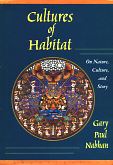Nabhan, Gary P. 1997. Cultures of
Habitat: On Nature, Culture and
Story. Washington, D.C.,
Counterpoint. Contact: Counterpoint,
P.O. Box 65793, Washington, D.C.
20035-5793.
 Gary
Nabhan’s latest book is a series
of essays in which he tackles, in his
words, “relationships among
cultural diversity, community
stability, and the conservation of
biological diversity in natural
habitats. Why are naturally diverse
regions also culturally diverse? What
allows certain communities to resist
harmful economic and social change?
Do these communities retain more
intact habitats in their homeland
because of this resistance? Why do
such similar forces seem to undercut
both biological and cultural
diversity, and what can we do to
control these forces”.
Gary
Nabhan’s latest book is a series
of essays in which he tackles, in his
words, “relationships among
cultural diversity, community
stability, and the conservation of
biological diversity in natural
habitats. Why are naturally diverse
regions also culturally diverse? What
allows certain communities to resist
harmful economic and social change?
Do these communities retain more
intact habitats in their homeland
because of this resistance? Why do
such similar forces seem to undercut
both biological and cultural
diversity, and what can we do to
control these forces”.
Bayer, W. and A. Waters-Bayer.
1998. Forage Husbandry. The
Tropical Agriculturist Series. London
& Basingstoke, Macmillan
Education Ltd.
The Tropical Agriculturalist
series is intended to provide
up-to-date information for students,
extension agents and farmers, written
in an easy- to-understand manner. All
the books are prepared by specialists
who have worked in several tropical
countries or regions. This volume is
written by Wolfgang Bayer in
collaboration with Ann Waters-Bayer,
both of whom have considerable
experience in forage husbandry and
farming systems research and
development in a number of countries
in the tropics and subtropics.
There are many books written on
pasture and forage production in
temperate and tropical climates, but
few have attempted to deal with the
subject when applied to smallholder
or non-commercial systems. The
authors show not only how forage is
grown, used and stored, but also how
it is integrated into the overall
farming systems. They refer to
systems in which small-scale farmers
cultivate land and keep some
livestock, as well as to those in
which pastoralists husband the
available resources to sustain their
livestock through the varying seasons
of the year.
The book covers situations that
exist in regions ranging from deserts
to humid grasslands and from low to
high altitudes, and deals with
livestock systems ranging from
nomadic pastoralism to intensive
stall- feeding of animals.
Particularly valuable are the case
studies used to illustrate systems of
forage husbandry ranging from
management of natural grassland to
the production of high-quality forage
crops. This book should help the
reader to understand various aspects
of forage husbandry under numerous
different situations in the tropics.
It also indicates how forage
husbandry systems are and can be
developed in a sustainable way
through a process of participatory
research and innovation. (Written by
Anthony J Smith, Edinburgh)
198 pp, 216 x 138 mm, paperback,
32 B/W photographs, ISBN 0 333 66856
1, £7.
Contents:
1. Introduction
2. Livestock keepers and their
farming systems
3. Livestock and forage: some
basic biology
4. Management of livestock and
forage resources
5. Managing natural forage
6. Forage as auxiliary product
from cultivated land
7. Cultivated forages
8. Forage conservation and
supplementation
9. Research and development in
forage husbandry
The book is a co-publication of
Macmillan, CTA and GTZ.
Orders:
or, for people in APC countries:
- CTA (Technical Centre for
Agricultural and Rural
Cooperation)
Postbus 380, NL-6700 AJ
Wageningen, The Netherlands
Fax: +31.317.460067
E-mail: cta@cta.nl